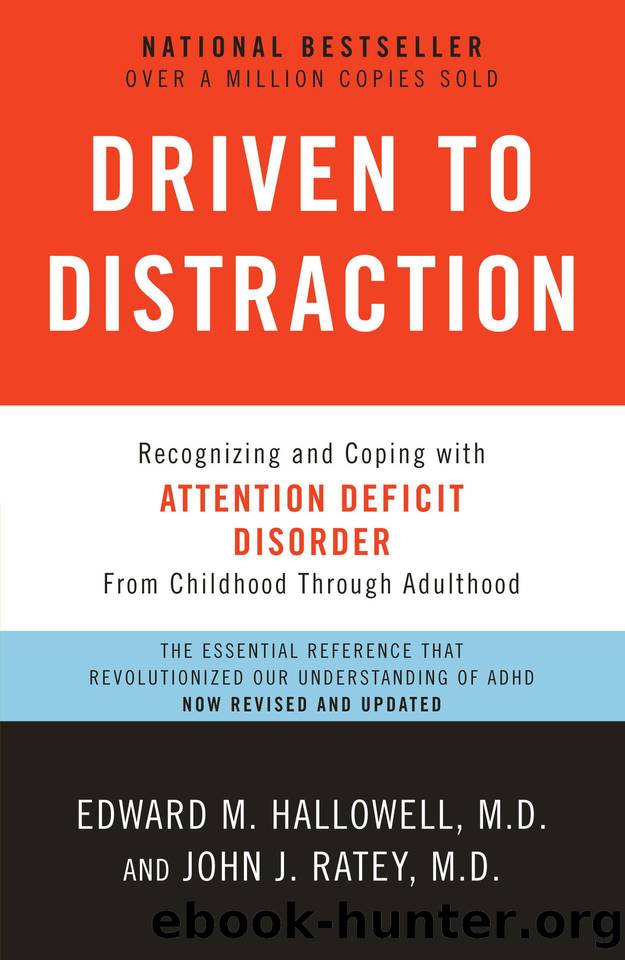Driven to Distraction (Revised) by Edward M. Hallowell & John J. Ratey

Author:Edward M. Hallowell & John J. Ratey [Hallowell, Edward M. & Ratey, John J.]
Language: eng
Format: epub
Publisher: Knopf Doubleday Publishing Group
Published: 2011-09-13T00:00:00+00:00
TWENTY-FIVE TIPS ON THE MANAGEMENT OF ADD WITHIN FAMILIES
1. Get an accurate diagnosis. This is the starting point of all treatment for ADD.
2. Educate the family. All members of the family need to learn the facts about ADD as the first step in the treatment. Many problems will take care of themselves once all family members understand what is going on. The education process should take place with the entire family, if possible. Each member of the family will have questions. Make sure all these questions get answered.
3. Try to change the family âreputationâ of the person with ADD. Reputations within families, like reputations within towns or organizations, keep a person in one set or mold. Recasting within the family the reputation of the person with ADD can set up brighter expectations. If you are expected to screw up, you probably will; if you are expected to succeed, you just might. It may be hard to believe at first, but having ADD can be more a gift than a curse. Try to see and develop the positive aspects of the person with ADD, and try to change his family reputation to accentuate these positive aspects. Remember, this person usually brings a special something to the familyâspecial energies, special creativity, special humor. He (or she) usually livens up any gathering he attends, and even when he is disruptive, itâs usually exciting to have him around. He punctures bombast and does not tolerate fools. He is irreverent and not afraid to speak his mind. He has a lot to give, and the family, more than any group of people, can help him reach his potential.
4. Make it clear that ADD is nobodyâs fault. It is not Momâs or Dadâs fault. It is not brotherâs or sisterâs fault. It is not Grandmotherâs fault, and it is not the fault of the person who has ADD. It is nobodyâs fault. It is extremely important that this be understood and believed by all members of the family. Lingering feelings that ADD is just an excuse for irresponsible behavior or that ADD is caused by laziness will sabotage treatment.
5. Also make it clear that ADD is a family issue. Unlike some medical problems, ADD touches upon everybody in the family in a daily, significant way. It affects early-morning behavior, it affects dinner-table behavior, it affects vacations, and it affects quiet time. Let each member of the family become a part of the solution, just as each member of the family has been a part of the problem.
6. Pay attention to the âbalance of attentionâ within the family. Try to correct any imbalance. Often, when one child has ADD, his siblings get less attention. The attention may be negative, but the child with ADD often gets more than his share of parentsâ time and attention day in and day out. This imbalance of attention can create resentment among siblings, as well as deprive them of what they need. Bear in mind that being the sibling of a child with ADD carries its own special burdens.
Download
This site does not store any files on its server. We only index and link to content provided by other sites. Please contact the content providers to delete copyright contents if any and email us, we'll remove relevant links or contents immediately.
| Behavioral Disorders | Communicative Disorders |
| Gifted Students | Inclusive Education |
| Learning Disabled | Mentally Disabled |
| Physically Disabled |
The Art of Coaching Workbook by Elena Aguilar(51198)
Trainspotting by Irvine Welsh(21665)
Twilight of the Idols With the Antichrist and Ecce Homo by Friedrich Nietzsche(18632)
Fangirl by Rainbow Rowell(9249)
Periodization Training for Sports by Tudor Bompa(8271)
Change Your Questions, Change Your Life by Marilee Adams(7780)
This Is How You Lose Her by Junot Diaz(6886)
Asking the Right Questions: A Guide to Critical Thinking by M. Neil Browne & Stuart M. Keeley(5775)
Grit by Angela Duckworth(5614)
Red Sparrow by Jason Matthews(5472)
Paper Towns by Green John(5190)
Room 212 by Kate Stewart(5120)
Ken Follett - World without end by Ken Follett(4731)
Housekeeping by Marilynne Robinson(4447)
The Sports Rules Book by Human Kinetics(4386)
Papillon (English) by Henri Charrière(4274)
Double Down (Diary of a Wimpy Kid Book 11) by Jeff Kinney(4271)
The Motorcycle Diaries by Ernesto Che Guevara(4098)
Exercise Technique Manual for Resistance Training by National Strength & Conditioning Association(4071)
